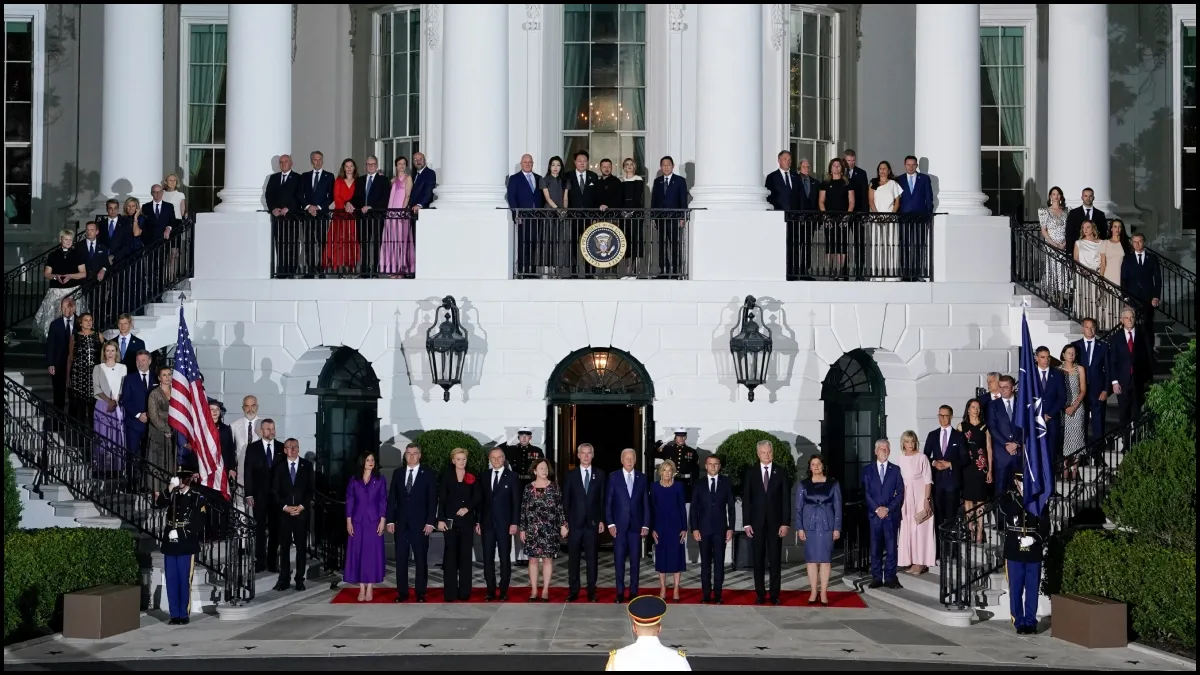NATO expresses concern over deepening China-Russia ties, calls Beijing 'decisive enabler' of Ukraine war
In the strongly-worded communique, NATO member countries said China had become a war enabler through its "no-limits partnership". China has continued to export machine tools, electronics and other items seen as contributing to the Russian war effort.

Washington: Allies of the North Atlantic Treaty Organisation (NATO), who are currently in Washington, made their sharpest rebuke of China by expressing concerns over its deepening ties with Russia, calling Beijing a "decisive enabler" of Moscow's war in Ukraine. The final communique, known as the Washington Declaration, made it clear that China was becoming a focus of the military alliance due to its rising nuclear arsenal and its capabilities in space.
Beijing has denied that it supports Russia's war efforts and insists that it conducts normal trade with its northern neighbour. However, relations between Moscow and Beijing are at their highest, as China has strengthened its trade and military ties with Russia in recent years, supplying machine tools, electronics and other items seen as contributing to the Russian war effort, without actually exporting weaponry. China has so far refused to condemn the Ukraine invasion and has actively called for both sides to discuss peace on the table.
In the communique, NATO member countries said China has become a war enabler through its "no-limits partnership" with Russia and its large-scale support for Russia's defence industrial base. It called on China to cease all material and political support for Russia's war effort.
"This increases the threat Russia poses to its neighbours and to Euro-Atlantic security. We call on the PRC, as a permanent member of the United Nations Security Council with a particular responsibility to uphold the purposes and principles of the UN Charter, to cease all material and political support to Russia's war effort," read the communique, which referred to China by the abbreviation of its official name, the People's Republic of China.
What did NATO say on Russia and Ukraine?
"The deepening strategic partnership between Russia and the PRC and their mutually reinforcing attempts to undercut and reshape the rules-based international order, are a cause for profound concern. We are confronted by hybrid, cyber, space, and other threats and malicious activities from state and non-state actors," said the declaration.
In its strongly worded Washington Declaration, NATO condemned Russia's "irresponsible nuclear rhetoric and coercive nuclear signalling, including its announced stationing of nuclear weapons in Belarus," adding that Minsk continues to enable Russia's war in Ukraine. However, allies remain willing to maintain channels of communication with Moscow to "mitigate risk and prevent escalation.
The declaration says the alliance will continue to support Ukraine "on its irreversible path to full Euro-Atlantic integration, including NATO membership" as Kyiv continues the "vital work" of democratic, economic and security reforms. It reaffirms that NATO will "be in a position to extend an invitation to Ukraine to join the alliance when allies agree and conditions are met."
Allies of the transatlantic military alliance have also announced a minimum funding of 40 billion euros ($43.28 billion) in military aid for Kyiv within the next year, but stopped short of the multiyear financial pledge that NATO Secretary General Jens Stoltenberg had sought. Some diplomats see this as an effort to safeguard the process from a possible return of Donald Trump to the White House.
China's position on NATO
There was no immediate comment from China on the latest NATO declaration. Beijing has expressed displeasure at NATO's growing interest in Asia and demanded the alliance stay out of the Asia-Pacific region and not incite confrontation. "NATO should not use China to justify its insertion into the Asia-Pacific and attempt to disrupt regional dynamics," said Lin Jian, a spokesman for the Chinese foreign ministry, on Tuesday.
Danny Russel, a former assistant secretary of state for Asia and now vice president for international security and diplomacy at the Asia Society Policy Institute, called the new wording by NATO "an extraordinary step", particularly since it was coupled with the warning that Beijing continues to pose systemic challenges to European interests and security in the same communique.
In May, China hosted Russian President Vladimir Putin for a two-day visit, where the two leaders had a detailed discussion on the entire range of issues related to the comprehensive partnership and strategic cooperation between their countries. China has sought to project itself as a neutral party in the conflict, but has declared a “no limits” relationship with Russia in opposition to the West. It also proposed a 12-point peace plan for Ukraine, calling for a ceasefire and denouncing sanctions against Russia.
The closeness between China and Russia may make it uncomfortable for India and the United States amid the fact New Delhi remained the most tested friend of Moscow and Beijing and Moscow remains one of the top economic contenders of Washington. When it comes to New Delhi, it has shown a rigid spine to back Russia after Putin launched a full-fledged war against Ukraine. On the other hand, US President Biden Joe Biden showered tons of sanctions on Moscow in an attempt to penalise Moscow.
(with inputs from agencies)
ALSO READ | Xi Jinping calls on world powers to help Russia and Ukraine resume direct dialogue